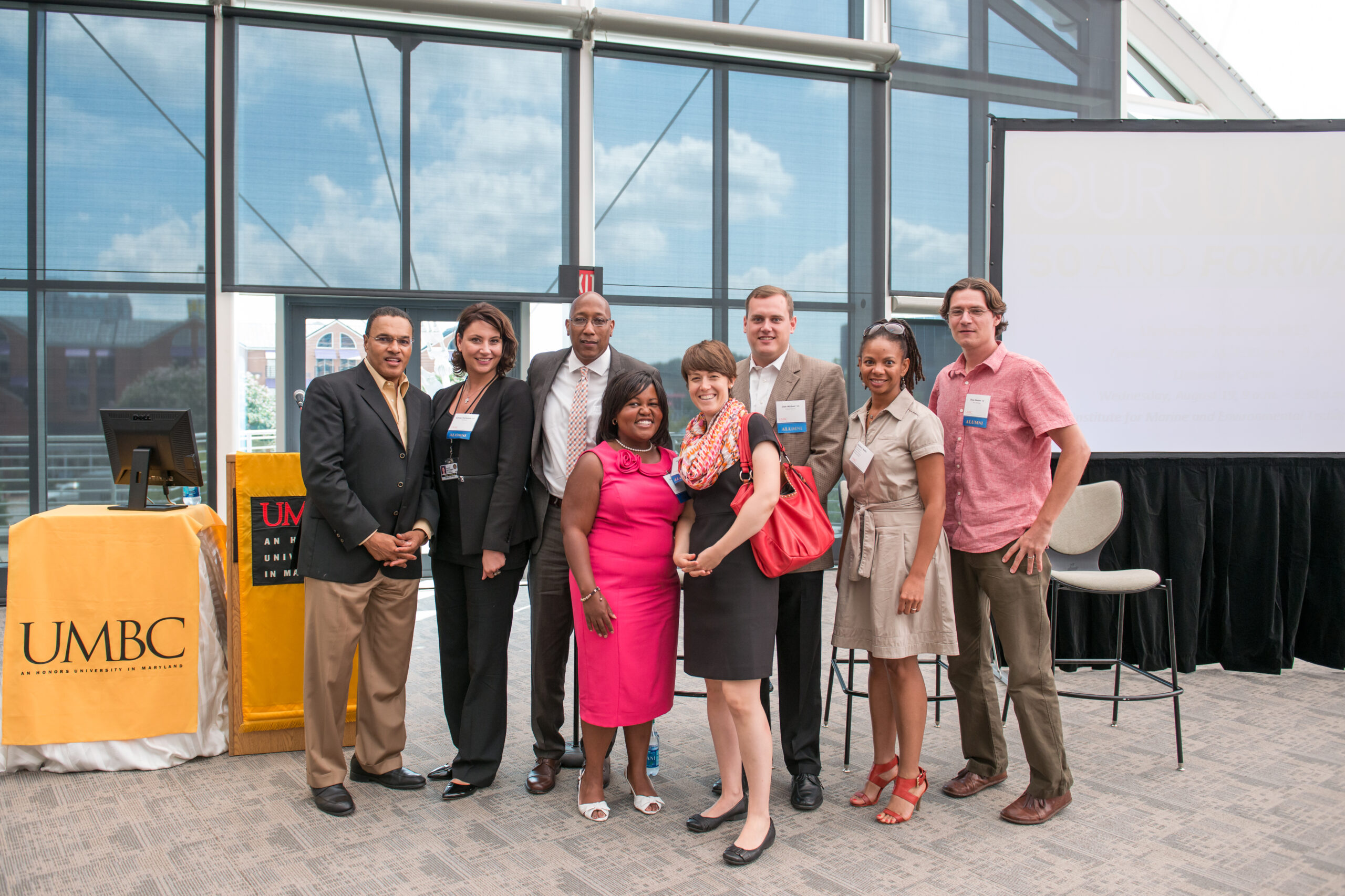Joe Jones remembers the day vividly. After attending Freddie Gray’s funeral at New Shiloh Baptist Church on April 27, 2015, he walked to his office across the street at the Center for Urban Families (CFUF) and found his staff gathered around a television watching CNN footage of unrest just blocks away. As he shared that experience with a crowd of UMBC faculty, staff, and student leaders four months later, he emphasized that two words came to mind as CFUF planned how to move forward with community-building in Baltimore: respect and trust.
Jones ‘06, social work, was one of six UMBC alumni who participated in a panel discussion, August 19, 2015, at UMBC’s annual retreat for university planning. A full day of this year’s retreat focused on understanding the university’s connections with Baltimore through engaged scholarship, teaching, and community partnerships, and sharing ideas for building on those relationships.
“Many of our alumni are deeply involved in improving the lives of Baltimore citizens,” shared Kimberly Moffitt, associate professor of American studies, who moderated the panel. She said that the six alumni participants “represent a powerhouse of commitment and ideas.”
Kaliope Parthemos ’93, psychology, serves as chief of staff for Baltimore Mayor Stephanie Rawlings-Blake. Alicia Wilson ’04, political science, is an attorney focused on employment and labor law at Gordon Feinblatt. Jones is the founder and CEO of the Center for Urban Families, and Ross Dionne ’14, M.A., applied sociology, is a researcher at the Friends Research Institute, an organization focused on substance abuse, HIV/AIDS, mental health, and criminal justice. Caryn Horrigan ’09, M.A., TESOL, is a teacher at Lakeland Elementary/Middle School, and Josh Michael ’10, political science, is teacher at Commodore John Rodgers Elementary/Middle School.
At the start of the event, the alumni shared their personal experiences surrounding the April unrest, as well as how the spring’s events impacted the communities they serve.
Parthemos provided a powerful account of how she worked closely with the mayor and city staff to ensure the safety of Baltimore residents during the unrest. “For me, my story…is not only a story of the anger and disenfranchisement you saw with the community…but it’s also a story of how the community came together and stepped up and said this day is not going to define Baltimore,” Parthemos reflected. “It’s how we rebuild.”
Horrigan showed the broader context in which her students understood the unrest. She shared that they experienced April’s events not as isolated, but as a continuation of unrest following several incidents of police-involved deaths of African American men around the country. She emphasized that her students will continue to ask difficult questions about these incidents and their underlying causes throughout the upcoming school year.
In sharing their perspectives and their journeys, the panelists also helped the audience think about UMBC’s role in preparing students to address inequalities in Baltimore. They shared ideas for how the university community could be better equipped to understand and educate our students about the complexities of social and economic disparities.
“There are 100 reasons why it’s difficult to make partnerships in your work, whatever it may be, with an institution that’s engaging in an urban city…but we have to fight through that work because the engagement with students, youth, families, and communities in Baltimore is so rich,” asserted Josh Michael.
Alicia Wilson described her undergraduate volunteer experience tutoring adults learning how to read so they could help their school-age children with homework. She highlighted the importance of continuing the work of the Shriver Center, Sondheim Public Affairs Scholars Program, Choice Program, and other groups on campus—sentiments echoed by Ross Dionne with his experience as a Shriver Peaceworker Fellow—to expose students to experiences beyond the classroom that will expand their worldviews and sense of how they can have a career with impact.
“Those experiences helped me put names to faces and to the issues we think about in the abstract,” Wilson shared. “The more concrete experiences I think the students have, the better off they are, and the better…leaders they can be in the communities that we serve.”
Following the panelists’ remarks, Moffitt left the audience with a charge to explore how UMBC can expand and deepen engagement with Baltimore City. “Yes, we’ve done well…but it’s now time to raise the bar to the next level of work that needs to be done.”
“Thank you so much for your time and for sharing your stories,” Moffitt told the panelists, sharing a comment from a UMBC community member in the audience. “You have challenged us to do more and to do better.”
Image (left to right): President Freeman Hrabowski, Kaliope Parthemos ’93, psychology, Joe Jones ’06, social work, Alicia Wilson ’04, political science, Caryn Horrigan ’09, M.A., TESOL, Josh Michael ’10, political science, Kimberly Moffitt, associate professor of American studies, Ross Dionne ’14, M.A., applied sociology. Photo by Marlayna Demond ’11.
Tags: Alumni, AmericanStudies, CAHSS, Education, PoliticalScience, Psychology, SAPH

